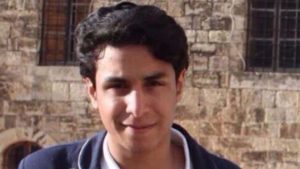-
Iran’s hypocrisy exposed as scores of juvenile offenders condemned to gallows
Iran’s hypocrisy exposed as scores of juvenile offenders condemned to gallows | Amnesty International https://www.amnesty.org/en/latest/news/2016/01/irans-hypocrisy-exposed-as-scores-of-juvenile-offenders-condemned-to-gallows/
-
Stop Child Executions in Saudi Arabia
UN Rights Experts urge Riyadh to Stop Child Executions source: http://www.presstv.ir/Detail/2015/09/23/430333/Saudi-Arabia-UN-Ali-Mohammed-alNimr-Qatif-Eastern-Province A group of human rights experts affiliated with
-
Salar Shadizadi scheduled execution Aug 1st
Juvenile offender Salar Shadizadi is at imminent risk of execution for a murder allegedly committed when he was
-
Hamid Ahmadi
Iran: Juvenile offender faces imminent execution despite ongoing review of case Source: Amnesty International A 24-year-old man is
-
Saman Naseem at risk of imminent execution
EXECUTION LOOMS FOR SAMAN NASEEM Source: Amnesty International Iranian juvenile offender, Saman Naseem, could be executed as
-
Alleged juvenile offender risk of execution in Iran
Source: AI http://www.amnesty.org/en/news/iran-alleged-juvenile-offender-among-10-hunger-strikers-threatened-immediate-execution-2014-12-?linkId=11183616 16 December 2014 Iran: Alleged juvenile offender among 10 hunger strikers threatened with immediate execution The
-
Fardin Jafarian executed in Tabriz
A Juvenile executed at Tabriz Central Prison Source: https://hra-news.org/en/juvenile-executed-tabriz-central-prison A close relative who preferred to remain anonymous told HRANA’s
-
Razieh Ebrahimi faces execution
Source AI: http://www.amnesty.org/en/library/asset/MDE13/037/2014/en/df990577-e767-4890-b6d9-a07961195741/mde130372014en.pdf Juvenile offender Razieh Ebrahimi has been sentenced to death for the murder of her husband in
-
Rasoul Haloumi asked to pay blood money
JUVENILE OFFENDER AT RISK OF EXECUTION IN IRAN Iranian juvenile offender Rasoul Holoumi is at risk of execution
-
Amir Sardhaei executed
Another Juvenile Execution in Iran July 4th 2014 Source Iran HUMAN RIGHTS http://iranhr.net/2014/07/another-juvenile-execution-in-iran/ Despite international protests, Iranian authorities have
-
Razieh Ebrahimi imminent risk of execution
26/06/2014 High Commissioner for Human Rights Source : http://shaheedoniran.org/english/human-rights-at-the-united-nations/human-rights-monitoring-mechanisms/high-commissioner-office/execution-of-juvenile-offenders-breaches-international-law-pillay/ Execution of juvenile offenders breaches international law – Pillay Navi Pillay,
-
Afghan Juvenile executed in Iran
Afghan Juvenile Executed in Iran for Drug-Related Charges – MAY 6, 2014 Source: Iran Human Rights http://iranhr.net/2014/05/afghan-juvenile-executed-in-iran-for-drug-related-charges/ A 15 year



